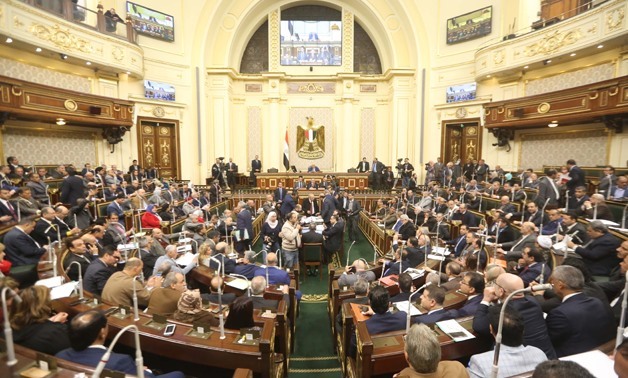
FILE- Members of Parliament start voting on the newly-proposed amendments to the 2014 Constitution on Thursday- Egypt Today/Hazem Abdel-Samad
CAIRO- 18 April 2020: The Legislative Committee of the Egyptian House of Representatives has approved new amendments to the Emergency Law NO. 162 of 1958, giving the president more powers to face the outbreak of the novel Coronavirus (COVID-19).
The new amendments give the president the power to take the necessary measures concerning the health emergency that Egypt declared since mid-March to fight the outbreak of the coronavirus pandemic.
As per the amendments, the president has the right to suspend the study at schools and universities and the work in governmental and private institutions, and to postpone the payment for the electricity, water and gas services.
The new articles grant the president the right to ban public and private meetings, demonstrations, processions, celebrations and other forms of gatherings. The president also shall have the authority to impose quarantine on returnees from abroad, to ban exporting some goods and products, and to place restrictions on trading, transporting, selling or possessing some commodities and products.
He was also given the power to price some services, goods, or products, and to provide the mechanism of fundraising in the emergency and to set the rules of funding and allocating the cash and in-kind donations. In addition to this, he has the authority to postpone the payment of certain taxes for three months.
The newly-added articles grant the president to authority to direct some governmental or private hospitals to work with all capacities in a health emergency. These hospitals shall come under administrative supervision determined by the president.
The president has the right to control scientific and laboratory works and research with regard to dealing with biological materials and tightening procedures for their acquisition. He also has been authorized to control the ways of disposing of biological waste.
Furthermore, he has the authority to provide financial or in-kind support for the affected economic sectors and to transfer some schools, youth centers and other places owned by the state, public business sector companies, or the public sector to temporary field hospitals.
On April 14, 2020, the parliament approved the extension of the three-month emergency law for the 11th time starting from January 27, 2020.
Since mid-March, Egypt has taken certain strict measures to protect the public from the spread of coronavirus pandemic. The government has taken gradual steps in dealing with the coronavirus spread, starting with suspending schools and universities, and international flights.
Furthermore, a night-time curfew was imposed on March 24, 2020, while all restaurants, cafes, cafeterias, casinos, night clubs, bars, shopping centers (malls), and other local shops shut down completely until April 23.
Additionally, the Ministry of Awqaf [Endowment] extended the closure of the mosques and the places of worship nationwide until further notice.
The Ministry of Health announced Saturday recording 188 new coronavirus cases and 19 deaths.
According to Health Ministry Spokesman Khaled Megahed, the new cases raises Egypt’s total number of COVID-19 cases to 3032 and deaths to 224.
He added that the number of coronavirus cases whose tests turned from positive to negative increased to 980, including 701 people who recovered from the virus.
The death rate for the COVID-19 in Egypt decreased from 7.5% to 7.3%, data published by the Health Ministry revealed.


Comments
Leave a Comment